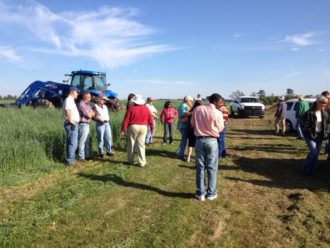GRIFFIN, Georgia – Southern Sustainable Agriculture Research and Education (SSARE) is seeking an academic professional at an 1862 land-grant institution in the Southern region to serve as the liaison between the program and the 1862 LGU system.
The goals of the position are:
- To increase participation and/or interest in sustainable agriculture with stakeholders in states and territories across the Southern region;
- Assist in identifying new ways to innovate sustainable agriculture technologies and practices;
- Work with SSARE’s Professional Development Program to connect Cooperative Extension with rural and urban communities in more sustainable agriculture efforts; and
- Strengthen the connection between NGOs and 1862 land-grant institutions in each state.
This position will be filled by a faculty member at one of the Southern region 1862 land-grant institutions at a 33 percent to 50 percent FTE.
The deadline to apply is Dec. 31, 2020 at the following link: https://forms.gle/eb9TLv45McMDSs4d7
The position is scheduled to begin March 1, 2021. For questions, contact Candace Pollock-Moore at cpollock@uga.edu or 770-412-4786.
“This is truly a “mission-focused” position – working with faculty, agents and other LGU staff to help the agriculture community adopt more sustainable practices,” said Lee Meyer, University of Kentucky professor emeritus and the current Southern SARE 1862 land-grant liaison. Meyer, an Extension professor in the Department of Agricultural Economics, will retire from the liaison position at the end of the year. “The liaison will have the opportunity to creatively build relationships, not only in the land-grant community, but also with SARE staff and leaders.”
Qualifications:
The Southern SARE 1862 Land-Grant University Liaison must have the following qualifications:
A minimum of a PhD degree in Agriculture-related fields, Economics, Food Science, Sociology/Social Science, Forestry, or other science-related areas.
The applicant should:
- Be knowledgeable about sustainable agriculture.
- Demonstrate strong leadership, outreach and communications skills.
- Demonstrate knowledge of the Sustainable Agriculture Research and Education Program.
- Demonstrate the ability to disseminate educational/resource information to university faculty, staff, administrators and other community members throughout the region.
- Demonstrate an ability and willingness to be an enthusiastic ambassador for sustainable agriculture.
- Be familiar with the background and philosophy of sustainable agriculture.
- The applicant should be well-versed in advocating and enhancing equity in sustainable agriculture among stakeholders. SSARE values diversity, equity and engagement.
- Have had experience with the SSARE program.
Activities:
Roles and responsibilities of the Southern SARE 1862 Land-Grant University Liaison include:
- Serve as the lead to the Southern SARE Outreach Team to promote the SARE program among administrators, faculty, staff, and Extension in colleges of agriculture, and other community stakeholders across the region. Activities include in-person visits and/or webinar conferencing.
- Collaborate with the Southern SARE Professional Development Program (PDP) manager to assist in state ag coordinator training and program development, to strengthen and maximize the effectiveness of the state ag coordinator Model State Plans, and to identify best practices among states to improve sharing of sustainable agriculture information between state ag coordinators.
- Increase interest in collaboration between Southern SARE and our Land-Grant university partners as indicated by administrative support of state ag coordinators, submission of grant proposals, Southern SARE staff requests, Administrative Council recommendations, and other activities (including grant reviewing).
- Collaborate with the 1890 Minority and Limited-Resource Outreach Specialist on efforts related to historically underserved farmers and ranchers and community stakeholders, as well as strengthen partnerships with 1890 Land-Grant universities.
- Collaborate with the Southern SARE Communications Specialist on the sharing of training resources among states.
- Enhance recognition of partnerships with Southern SARE among regional organizations and community stakeholders.
- Work on projects as requested by the Administrative Council, including program evaluations, and provide feedback to Southern SARE leadership about programs and trends affecting sustainability programs and attitudes of non-profit sustainable agriculture organizations toward the SARE program.
Reimbursed travel will be involved to perform Outreach Team duties, conduct site visits, and attend relevant Southern SARE regional and national meetings and conferences.
Southern SARE is a USDA-funded program that provides funding opportunities for researchers, farmers, Cooperative Extension, NGOs, government agency personnel, and other ag professionals to conduct research in sustainable agriculture. Authorized in the 1985 Farm Bill, the mission of the SARE program is to promote sustainable agriculture practices throughout American agriculture that are profitable for the farmer, protect the environment, and promote community quality of life over the long term.
For more information on Southern SARE, visit http://www.southernsare.org.
Published by the Southern Region of the Sustainable Agriculture Research and Education (SARE) program. Funded by the USDA National Institute of Food and Agriculture (NIFA), Southern SARE operates under cooperative agreements with the University of Georgia, Fort Valley State University, and the Kerr Center for Sustainable Agriculture to offer competitive grants to advance sustainable agriculture in America's Southern region. This material is based upon work that is supported by the National Institute of Food and Agriculture, U.S. Department of Agriculture, through Southern Sustainable Agriculture Research and Education. USDA is an equal opportunity employer and service provider. Any opinions, findings, conclusions, or recommendations expressed in this publication are those of the author(s) and do not necessarily reflect the view of the U.S. Department of Agriculture.
